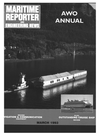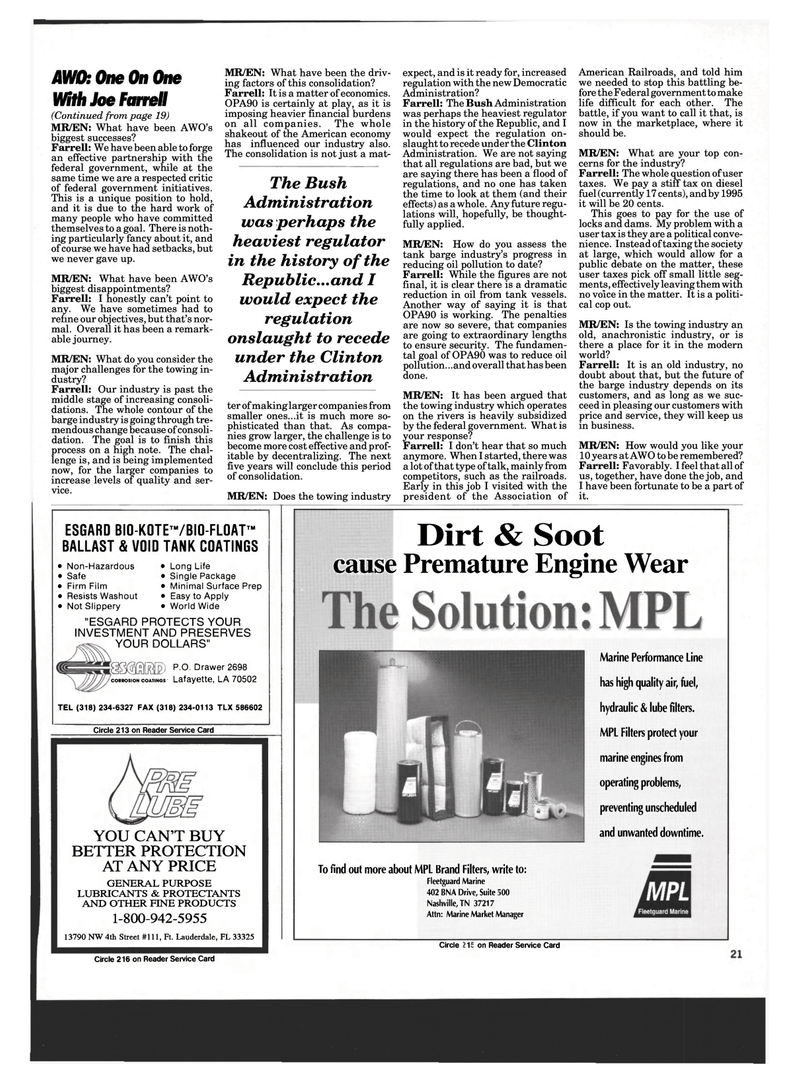
Page 19: of Maritime Reporter Magazine (March 1993)
Read this page in Pdf, Flash or Html5 edition of March 1993 Maritime Reporter Magazine
AWO: One On One
With Joe Farrell (Continued from page 19)
MR/EN: What have been AWO's biggest successes?
Farrell: We have been able to forge an effective partnership with the federal government, while at the same time we are a respected critic of federal government initiatives.
This is a unique position to hold, and it is due to the hard work of many people who have committed themselves to a goal. There is noth- ing particularly fancy about it, and of course we have had setbacks, but we never gave up.
MR/EN: What have been AWO's biggest disappointments?
Farrell: I honestly can't point to any. We have sometimes had to refine our objectives, but that's nor- mal. Overall it has been a remark- able journey.
MR/EN: What do you consider the major challenges for the towing in- dustry?
Farrell: Our industry is past the middle stage of increasing consoli- dations. The whole contour of the barge industry is going through tre- mendous change because of consoli- dation. The goal is to finish this process on a high note. The chal- lenge is, and is being implemented now, for the larger companies to increase levels of quality and ser- vice.
MR/EN: What have been the driv- ing factors of this consolidation?
Farrell: It is a matter of economics.
OPA90 is certainly at play, as it is imposing heavier financial burdens on all companies. The whole shakeout of the American economy has influenced our industry also.
The consolidation is not just a mat-
The Bush
Administration was perhaps the heaviest regulator in the history of the
Republic...and I would expect the regulation onslaught to recede under the Clinton
Administration ter of making larger companies from smaller ones...it is much more so- phisticated than that. As compa- nies grow larger, the challenge is to become more cost effective and prof- itable by decentralizing. The next five years will conclude this period of consolidation.
MR/EN: Does the towing industry expect, and is it ready for, increased regulation with the new Democratic
Administration?
Farrell: The Bush Administration was perhaps the heaviest regulator in the history of the Republic, and I would expect the regulation on- slaught to recede under the Clinton
Administration. We are not saying that all regulations are bad, but we are saying there has been a flood of regulations, and no one has taken the time to look at them (and their effects) as a whole. Any future regu- lations will, hopefully, be thought- fully applied.
MR/EN: How do you assess the tank barge industry's progress in reducing oil pollution to date?
Farrell: While the figures are not final, it is clear there is a dramatic reduction in oil from tank vessels.
Another way of saying it is that
OPA90 is working. The penalties are now so severe, that companies are going to extraordinary lengths to ensure security. The fundamen- tal goal of OPA90 was to reduce oil pollution... and overall that has been done.
MR/EN: It has been argued that the towing industry which operates on the rivers is heavily subsidized by the federal government. What is your response?
Farrell: I don't hear that so much anymore. When I started, there was a lot of that type of talk, mainly from competitors, such as the railroads.
Early in this job I visited with the president of the Association of
American Railroads, and told him we needed to stop this battling be- fore the Federal government to make life difficult for each other. The battle, if you want to call it that, is now in the marketplace, where it should be.
MR/EN: What are your top con- cerns for the industry?
Farrell: The whole question of user taxes. We pay a stiff tax on diesel fuel (currently 17 cents), and by 1995 it will be 20 cents.
This goes to pay for the use of locks and dams. My problem with a user tax is they are a political conve- nience. Instead of taxing the society at large, which would allow for a public debate on the matter, these user taxes pick off small little seg- ments, effectively leaving them with no voice in the matter. It is a politi- cal cop out.
MR/EN: Is the towing industry an old, anachronistic industry, or is there a place for it in the modern world?
Farrell: It is an old industry, no doubt about that, but the future of the barge industry depends on its customers, and as long as we suc- ceed in pleasing our customers with price and service, they will keep us in business.
MR/EN: How would you like your 10 years at AWO to be remembered?
Farrell: Favorably. I feel that all of us, together, have done the job, and
I have been fortunate to be a part of it.
YOU CAN'T BUY
BETTER PROTECTION
AT ANY PRICE
GENERAL PURPOSE
LUBRICANTS & PROTECTANTS
AND OTHER FINE PRODUCTS 1-800-942-5955 13790 NW 4th Street #111, Ft. Lauderdale, FL 33325
ESGARD BI0-K0TE™/BI0-FL0AT™
BALLAST & VOID TANK COATINGS
P.O. Drawer 2698
CORROSION COATINGS * Lafayette, LA 70502
TEL (318) 234-6327 FAX (318) 234-0113 TLX 586602
Circle 213 on Reader Service Card
Circle 313 on Reader Service Card
Circle 216 on Reader Service Card
Marine Performance Line has high quality air, fuel, • Non-Hazardous • Safe • Firm Film • Resists Washout • Not Slippery • Long Life • Single Package • Minimal Surface Prep • Easy to Apply • World Wide "ESGARD PROTECTS YOUR
INVESTMENT AND PRESERVES
YOUR DOLLARS"
Dirt & Soot cause Premature Engine Wear
To find out more about MPL Brand Filters, write to:
Fleetguard Marine 402 BNA Drive, Suite 500
Nashville, TN 37217
Attn: Marine Market Manager hydraulic & lube filters.
MPL Filters protect your marine engines from operating problems, preventing unscheduled and unwanted downtime.

 18
18

 20
20
